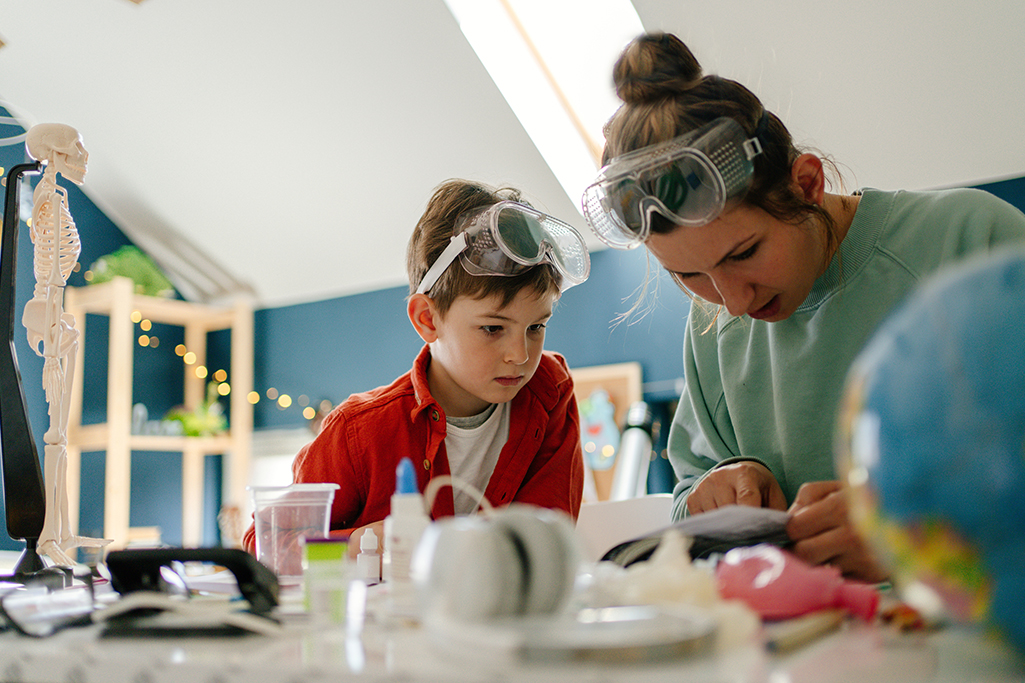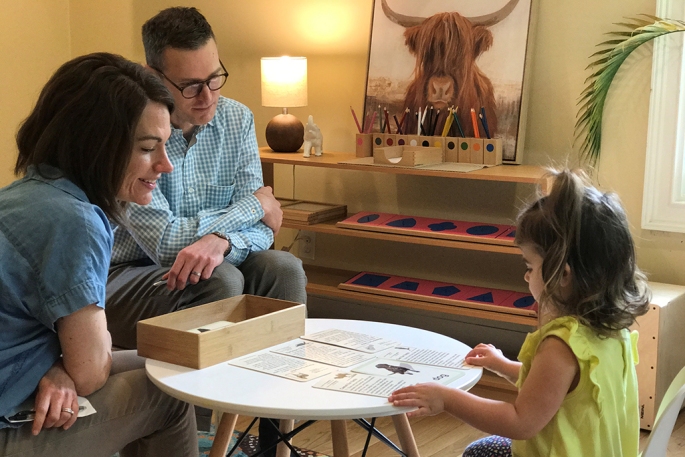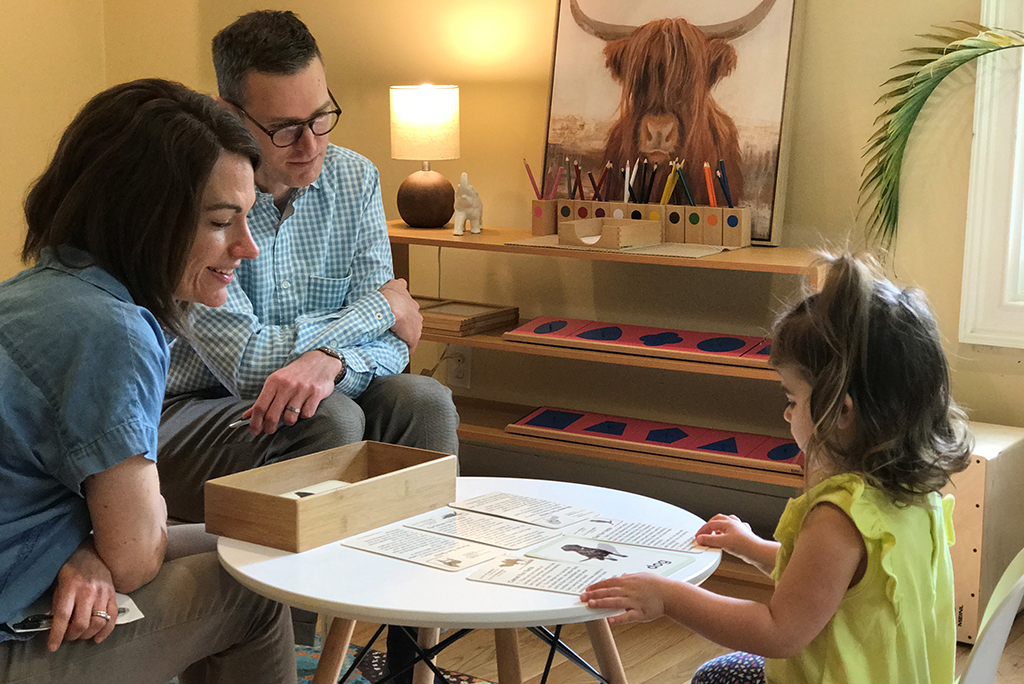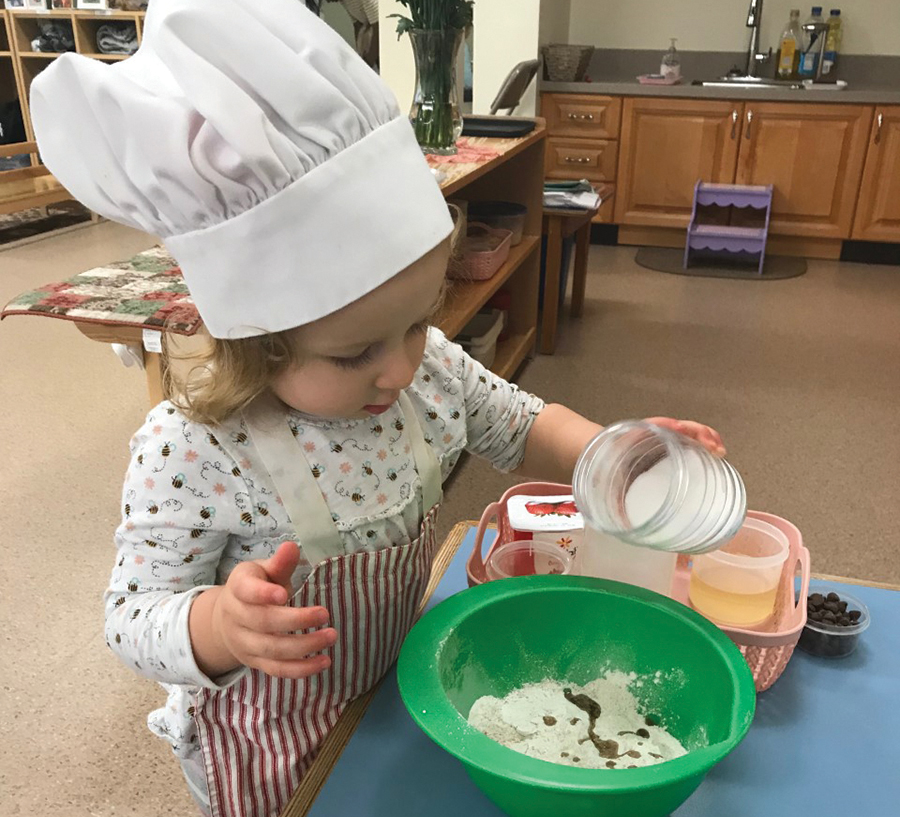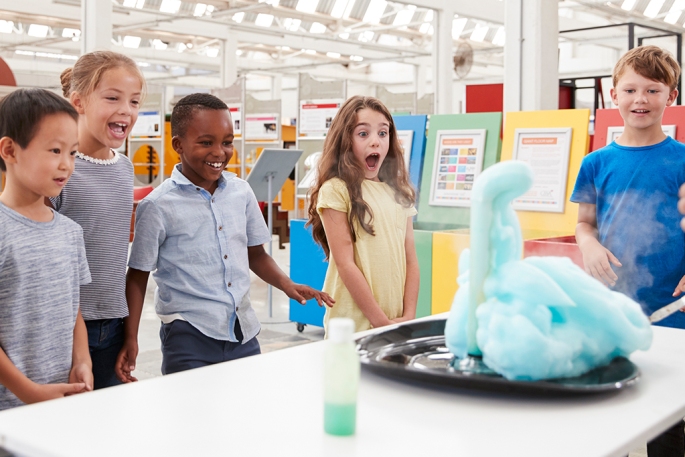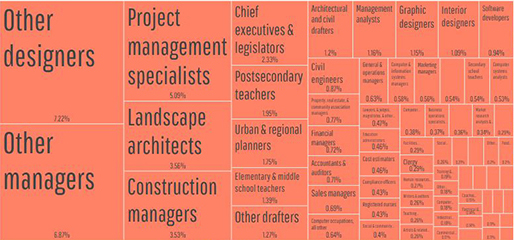
Whether your kids are attending school virtually or back in the classroom, these fun resources can enhance their education and keep them enthusiastic about learning. Many are free, and some may be offering free access for a limited time during the pandemic.
Academics
Play games and watch educational videos at PBS Kids. Sign up for their newsletter for daily activities and tips to help kids play and learn at home. Design Squad Global has items you can build at home with things you have on hand.
Explore hands-on activities you can do at home and check out free printables at We Are Teachers.
Highlights Kids has recipes, crafts, jokes, games, podcasts, science questions and facts to keep your child entertained.
Get free learning workbooks with edHelper.
Fact Monster offers facts and homework help in subjects such as math, science and language arts.
ABCya offers educational games for PreK through grades 6+, with the help of Fuzz Bugs, Adventure Man and more.
With National Geographic for Kids, explore topics like the U.S., plastic, books, science, space and more.
Funbrain offers games, books, comics and videos developing skills in math, reading, problem-solving and literacy. Funbrain Jr. focuses on math and reading skills, while offering printables for keeping kids entertained.
Fuel the Brain has educational worksheets for preschool through 5th grade, math, reading and writing, and learning games like Bank It! and Math Match.
Mr. Nussbaum’s subjects include math, language arts, history, geography, science, people, holidays and the U.S.A. Learn about each state, famous people, animals and more.
The Old Farmer’s Almanac for Kids explores weather, animals, the stars, history and has a question of the day.
Browse arts, astronomy and space, biology, earth science, history, social science and more with the Exploratorium’s online Learning Toolbox.
Turtle Diary has educational games to practice skills, including addition, typing and money, along with videos, experiments, puzzles, coloring sheets and more.
e-learning for kids offers lessons in math, science, health, language arts, life skills and more.
Sesame Street offers games, videos and art activities, as well as printables and a YouTube playlist of fun at home activities.
The Smithsonian Learning Lab covers a variety of topics, including social studies, language arts, science, arts and more. Watch Smithsonian’s educational videos for free.
Grid Club offers educational games focused on English, science, history, design, health, math, languages and more.
Khan Academy is offering daily schedules for students ages 4-18.
Play free educational games and compete against other players with Arcademics.
How Stuff Works explores health, science, auto, tech, animals and more, as well as quizzes and podcasts, like Stuff You Missed in History Class, for more learning.
TED Talks offer intellectual lectures on all kinds of topics, and animated videos explore topics in five minutes or less.
Lakeshore Learning has free resources, including lesson plans, worksheets, crafts and activities.
KiwiCo has at-home activities for kids ages 2-12+.
Kohl Children’s Museum has remote learning videos with stories, activities and experiments.
Listen and discuss ethical topics involving animals, technology, school and more with the SHORT & CURLY podcast.
Brains On! offers podcasts about weather, dust, animals and more, with accompanying videos to help you learn more.
Listenwise offers a free 30-day trial for 3-6 minute stories for grades 2-12.
But Why is a podcast that answers the questions kids send in.
Ear Snacks discusses music, science, art and culture.
All Kids Network has crafts, worksheets, coloring pages, mazes, hidden pictures and more.
Bamboo Learning offers learning opportunities through your Alexa or other voice-powered technology.
Beanstalk is offering free interactive kids’ classes for ages 1.5-6.
Get free access for two weeks to BetterChinese for elementary through college aged students to learn a new language or improve their skills.
Clark Creative Education has free resources and instructional materials.
With Conjuguemos, practice French, German, Italian, Korean, Latin, Portuguese and Spanish skills.
Explore free videos in 13 subject areas with HippoCampus.
ABCmouse has curriculum for ages 2-8 and is offering a 30-day free trial.
Access free educational programming and accompanying digital resources with GPB.
Learn a new language with Duolingo.
Arts Break is a curriculum designed program created by The New Victory Theater.
Petersen Automotive Museum has videos, coloring activities and building activities.
Learn with Snoopy and the rest of the Peanuts gang with lesson plans for grades K-8.
Take learning outdoors with TurfMutt’s lessons for grades K-8.
Show What You Know podcast gives three middle-grade contestants a chance to prove their knowledge with questions about the earth, the universe, ancient history and more.
English/Language Arts
Teach media literacy with The Paley Center for Media’s Zoom meetings, resource guides, online classes and more.
Read with Stay Home with Candlewick Press for activities, discussion guides, educational materials, videos and more, plus a free guide for young readers about coronavirus.
Starfall can help teach children to read with phonics and is for preschool through second grade students, as well as those learning the English language.
Storyline Online streams videos of children’s books, such as “A Bad Case of Stripes” and “Stellaluna,” with creative illustrations and read by celebrities.
Harper Collins has story times, read-alouds, activities and more each day at noon, a video series for ages 7-12, and book recommendations, charts, games and more on Wednesdays and Fridays.
Fun Fonix has worksheets and printable phonics workbooks.
Get your kids writing with The Story Starter, which provides a random sentence to write a story around.
Practice typing with TypingClub.
Build reading skills and comprehension with Squiggle Park for ages 3-8 or with Dreamscape for ages 8-15.
Lingokids’ Basic Plan allows you to learn English with three games, songs or videos a day.
Global Digital Library offers books for free to help kids practice their reading skills.
Libby allows you to access your local library’s ebooks and audiobooks.
Storynory offers free audio stories, including original stories, fairytales, classic authors, mythology and more.
Check out the language podcast, The Allusionist, for a discussion on words.
Book Club for Kids has a free podcast for middle schoolers to discuss books, and they’re offering free curriculum guides.
Classroom Cereal offers free grammar practice with printable short stories.
Try Homer for ages 2-8 with lessons on ABCs, phonics and sight words, letter tracing and more.
Enjoy storytimes with astronauts with Space Station Explorers’ Story Time From Space.
Check out downloadable activities to accompany Basher and Kingfisher children’s books.
Science
Check out High Touch High Tech’s online programs with a video presentation, guided questions and extending the lesson activities.
Make Me Genius offers science videos, facts and educational power points about science for kids in kindergarten through 7th grade.
NASA Kids’ Club for children pre-K through grade 4 offer games for STEM development, an image gallery and information about NASA.
Discover the science of earthquakes with USGS’s Earthquakes for Kids online programming.
Experiment with Steve Spangler Science, learning about air, chemistry, magnetism, weather and more.
The Happy Scientist discusses science topics, such as life, earth, chemical, space, physical and the process of science, and you can test your knowledge with a quiz.
Learn about space, including the solar system, gravity and black holes with Amazing Space.
Science Bob has videos and experiments for hands-on science activities.
Discover the purpose of cells, microbes and the immune system with CELLS alive.
Mystery Science is offering K-5 science lessons for at-home education, which include a learning activity.
The Show About Science discusses scientific research and discovery.
Shabam! blends fictional stories with real science for an interesting look at the progress humans have made.
Check out new discoveries in science and technology with Wow in the World.
EveryDay Earth has courses exploring earth science.
Exploring Nature covers life science, earth science and physical science with content, diagrams, activities, worksheets and more.
Get connected with nature and learn at home with Captain Planet Foundation.
Middle schoolers can sit in on daily science lessons with Natural History Museum of Utah’s Research Quest Live.
Science Mom is streaming lessons on YouTube.
Generation Genius has online science videos and lessons for grades K-5.
Check out National Girls Collaborative Project’s online learning resources for STEM.
“Global Problem Solvers” is an animated web series combining STEM learning with human skills, like teamwork, critical thinking and collaboration.
The Museum of Discovery and Science has virtual learning videos with accompanying activities.
History
Explore history in an interactive way with Mission US, where you can see what it was like to live in 1770, 1848, 1866, 1907, 1929 or 1941.
Help Jack and Annie of the Magic Tree House series solve missions as they travel through time.
Travel through time and history with What Was There to see what your hometown, state or country used to look like.
Check out the Who Was book series for a look at historical figures and see their sketch comedy show on Netflix.
History for Kids has articles, worksheets, quizzes and games to help make history relevant to kids.
Learn about the text, history and meaning of the U.S. Constitution at Constitution Center.
A Book In Time discusses the best historical reading books and offers crafts, games, maps and timelines for more historical exploration.
Travel to other countries and see famous places with GeoGuessr, which offers a free game.
Tour history with the British Museum’s virtual The Museum of the World experience.
Tour and learn more about the Great Wall of China.
Take a virtual tour of Yellowstone.
Follow Dr. Floyd on his adventures through history as he races against his arch nemesis, Dr. Steve.
Check out Revisionist History for an exploration of the historically misunderstood.
The Past and the Curious explores topics of historical relevance using stories and music.
Check out Big History Project for social studies curriculum for middle and high school students.
Fairfield Museum and History Center is sharing educational virtual activities and content.
Math
Cool Math offers pre-algebra, algebra and pre-calculus lessons, as well as fun games to help you practice.
With Crypto Club, crack ciphers, discover secrets and improve your math skills.
Get a free account on Prodigy to help your first to eighth grader learn and practice math.
Math Playground has learning games for grades 1-6.
SplashLearn offers a math learning program personalized for your child in grades K-5.
Start a free trial of Mathletics for an engaging online mathematics program.
Learn math skills for kindergarteners through eighth graders, as well as Algebra I and Geometry, with MathScore.
Take a personal finance class with AFSA Education Foundation’s MoneySKILL.
Learn financial literacy with Banzai!
Help children love numbers and grow their math skills with Bedtime Math.
Build math and computer skills with BlocksCAD, a specialized 3D CAD software.
Practice algebra and chemistry skills with FunBased Learning.
ST Math is a visual instructional program delving into concepts of math with free access through December 31.
The Arts
For a 360-degree look at famous artworks and sites, including the Uffizi Galleries, Carnegie Hall, Richmond Castle and more, explorations in color and more, check out Google’s Arts and Culture page.
Computer-based activities through the National Gallery of Art explore art and art history.
Learn and create music with Virtual Musical Instruments, which include the guitar, piano, panflute and drums.
Make art and learn about styles and artists with Tate Kids.
Artsology has arts games and investigations to explain artistic concepts.
Try SmartMusic for free for 30 days for music education tools.
The Kennedy Center has new releases, special series and original stories.
Go on a virtual tour of the Louvre.
Classics for Kids discusses the lives of classical musicians and offers games and lesson plans.
Watch Artageous with Nate, a YouTube show focused on traveling the globe to discover where creativity is happening.
Doodles Academy offers an art curriculum for grades 1-5 with free art projects.
Go through art lessons and learning activities with Sonoma Valley Museum of Art.
Animals
Aquarium of the Pacific has live webcams, an online learning center, videos with guest speakers and a podcast.
The New England Aquarium has virtual visits of the aquarium.
See live webcams of animals all around the world with Explore, and you can also view natural phenomena like the Aurora Borealis.
Shedd Aquarium’s YouTube channel has a video series for kids answering questions about animals.
Watch live cams and videos of the animals at the San Diego Zoo.
Reid Park Zoo has live webcams of elephants, giraffes, grizzly bears, lemurs and lions.
The Smithsonian’s National Zoo & Conservation Biology Institute has videos of naked mole-rats, lions, giant pandas and elephants.
Monterey Bay Aquarium has live cams of the aviary, coral reef, penguins, sea otters, sharks and more.
Take a virtual tour of the National Aquarium.
Go on a virtual field trip to the Seattle Aquarium.
Tennessee Aquarium has live streams, activity sheets, link to IMAX videos and more.
Download “Humane Heroes,” a series from Chicken Soup for the Soul about animals, that comes with 18 lesson plans.
Physical Education
Go Noodle will get your kids moving with videos and activities to help kids exercise and practice mindfulness.
Check out Cosmic Kids Yoga on YouTube for videos on yoga, mindfulness and relaxation for kids.
Carone Learning is offering free courses for elementary through high school students, including health, P.E. and nutrition.
Try family fitness workouts with Chuze Fitness.
Johns Creek Tumbles shares workout videos and STEAM projects for kids on YouTube.
The post At Home Online Learning Resources and Podcasts for Kids appeared first on Atlanta Parent.
Source
 School’s almost out, and kids are ready to kick back and take a break. Don’t let them lose academic ground – prevent the “summer slide” by keeping their minds active this summer. They’ll be having so much fun, they won’t realize they’re learning!
School’s almost out, and kids are ready to kick back and take a break. Don’t let them lose academic ground – prevent the “summer slide” by keeping their minds active this summer. They’ll be having so much fun, they won’t realize they’re learning!

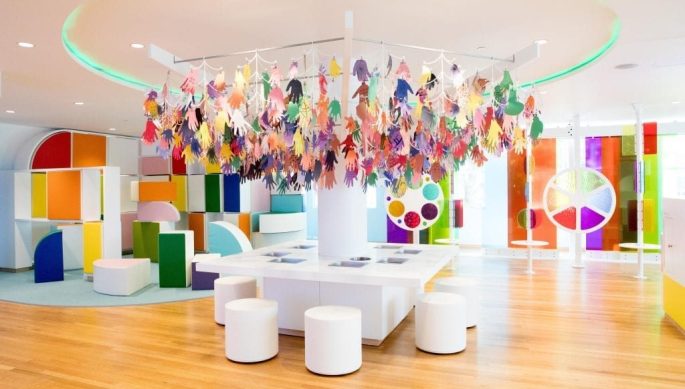









 STEAM has grown in popularity in recent years as a way to educate children for the 21st century. Foster a love of STEAM at home with these fun and easy ideas.
STEAM has grown in popularity in recent years as a way to educate children for the 21st century. Foster a love of STEAM at home with these fun and easy ideas.
 STEAM Online
STEAM Online

